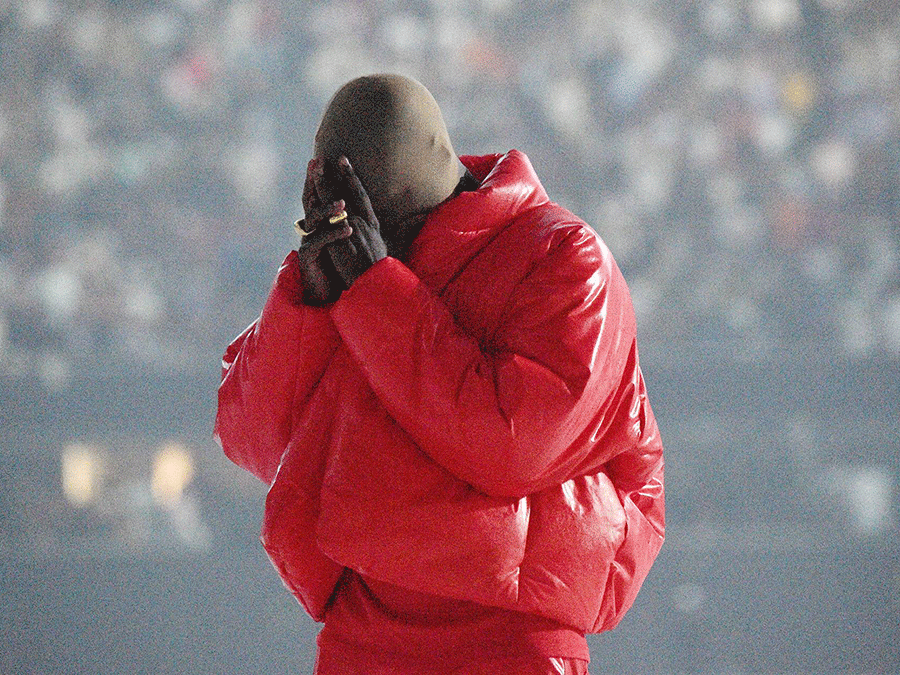Kanye West’s Quest for Perfection
With cult-like fanfare surrounding his elusive upcoming album, Donda, Harmony Holiday examines the US rapper’s erratic process
With cult-like fanfare surrounding his elusive upcoming album, Donda, Harmony Holiday examines the US rapper’s erratic process

Kanye West is good at breaking promises. He breaks them not out of malice, but from a place of pathological perfectionism. He teases new albums and then retracts the goods or delays them, editing the songs into phantoms, making them both passé and irresistible in his avid consumers’ eyes. He creates fanatics this way. They trade Yeezy Season Seven in private rooms and wear his hobo-chic designs as if they’re diamonds and play his fuzzy, unfinished symphonies as if they’re operas. West seeks attention with the obsessive zeal of a cult leader: you will fawn; you will love him; you will follow him over any cliff – or he will find a way to make you regret your tentative faith in his ability to mesmerize.
Fans are now awaiting Donda, his upcoming album. He has teased, debuted drafts at massive listening events, and then retracted the record. West has been disgraced before; he is not ashamed of delays. For this phase of his performance of self, he wears a flesh-toned durag over his entire face like a defamed superhero. Is this narcissism or self-preservation? There’s an element of suicidality in it, also, as if he’s going to suffocate himself in front of us if the sound doesn’t exhale for him. Next, he’s perched cryptically, in all black, with a knitted mask slitted at the eyes so we can see his disaffected but piercing gaze. He makes his Instagram account private. He’s released no public statements about his divorce from Kim Kardashian. He seems to be easing into the momentum of himself again, rebuilding an identity around the blunt confidence for which he was once demonized. He’s leaving the stigma behind and taking the charisma and outlandishness with him. It takes a lot to reappropriate oneself, and few famous Black people ever succeed.

Whether we like it or not, West is Christlike: he goes forth and tells no one; he allows us to project all of our complexes onto him; he contradicts himself with the ease of a jester; he has countless disciples; he revokes access to himself and goes into ascetic isolation when he feels it necessary. Right now, for example, it’s rumoured that he’s paying one million dollars a day to stay in a windowless room in Atlanta’s Mercedes Benz Stadium, where he’s finishing the album. The room is modelled after Vincent van Gogh’s The Bedroom (1888) and holds a single bed, one wardrobe with some rumpled outfits, a mounted television, beige walls and fluorescent lights. This is the room of a man palpably disturbed and unbothered at the same time. Far beyond a stunt, these antics are process and compulsion: an artist having a rebirth, realizing he has something new to say, and backing himself into a corner until he gets the words right. The room suggests commitment and focus but also punishment, exhaustion and a little self-loathing.
What is the value of West’s style of Christ consciousness if it leaves us with these vague idols and mirages: no gospel to consume, no lavish feasts, no known interval between appearances? The relationship between artists and their fans/consumers is one of abject co-dependency, but West’s fiendish resistance to typical promotional patterns forces people to fend for themselves. He does not entertain the derision he receives for his erratic cycles of hype and retreat, because they are part of his hyper self-conscious creative rhythm, part of his prayer ritual. His is the type of ego that needs to know how it’s being perceived or he will choose to elude all perception and cover his spirit in a durag.

This album is dedicated to his mother, Donda, with inevitable echoes of the nihilistic sweetness that he wears in his eyes finally divulging its deepest catalyst: the loss of his mother. Tears stream down his face at the listening party when he plays a song about losing his family. His family is in the audience. West emits this energy of pre-emptive and highly indulgent repentance as if he knows he disobeyed some grand rule but can’t remember how or when or why. The snippets we can hear from the listening events give the impression of a child asking his mother what happened and where he went wrong – a grown man struggling to reacquaint with the maternal and the feminine after having a trauma-induced shutdown. This man is inconsolable and therefore he does not have to worry about disappointing needy fans: he’s trying to repent for having undermined himself in some unnamable sense that Donda will help us understand. He’s underground, aiming for the resurrection we all need after the recent past’s cavalcade of demolitions. And maybe living in the stadium puts him in the mind of the victims who had to camp out in one in 2005 after Hurricane Katrina: the telethon where he defended them, the shellshock of consciousness breaking through the masks he wears, and the childlike gratification he derives when we go off-script with him.
Main image: Kanye West, Donda album cover (detail), 2021. Courtesy: the artist and GOOD Music and Def Jam Recordings





















